Abstract
The effects of the combination of a murine monoclonal antibody (MAb) specific for the O side chain of Pseudomonas aeruginosa Fisher immunotype 1 lipopolysaccharide and sparfloxacin in a neutropenic mouse model of P. aeruginosa pneumonia were examined. Under the condition that neither MAb at a dose of 500 micrograms per mouse administered intravenously nor a suboptimal dose of oral sparfloxacin (5 mg/kg of body weight) protected mice from challenge with a fatal dose, the combination therapy with MAb and sparfloxacin caused a significant increase in the survival rate (P less than 0.001 compared with either treatment alone). The effect of the combination was closely correlated to bacterial killing in plasma and lung tissue of infected mice. In vitro, a significant MAb-dependent, complement-mediated killing of P. aeruginosa was documented in the presence of sparfloxacin at one-half the MIC, while the killing was not observed in the absence of sparfloxacin. These in vivo and in vitro data suggest the usefulness of combination therapy with a lipopolysaccharide-reactive immunoglobulin G MAb and sparfloxacin in neutropenic patients with P. aeruginosa pneumonia.
Full text
PDF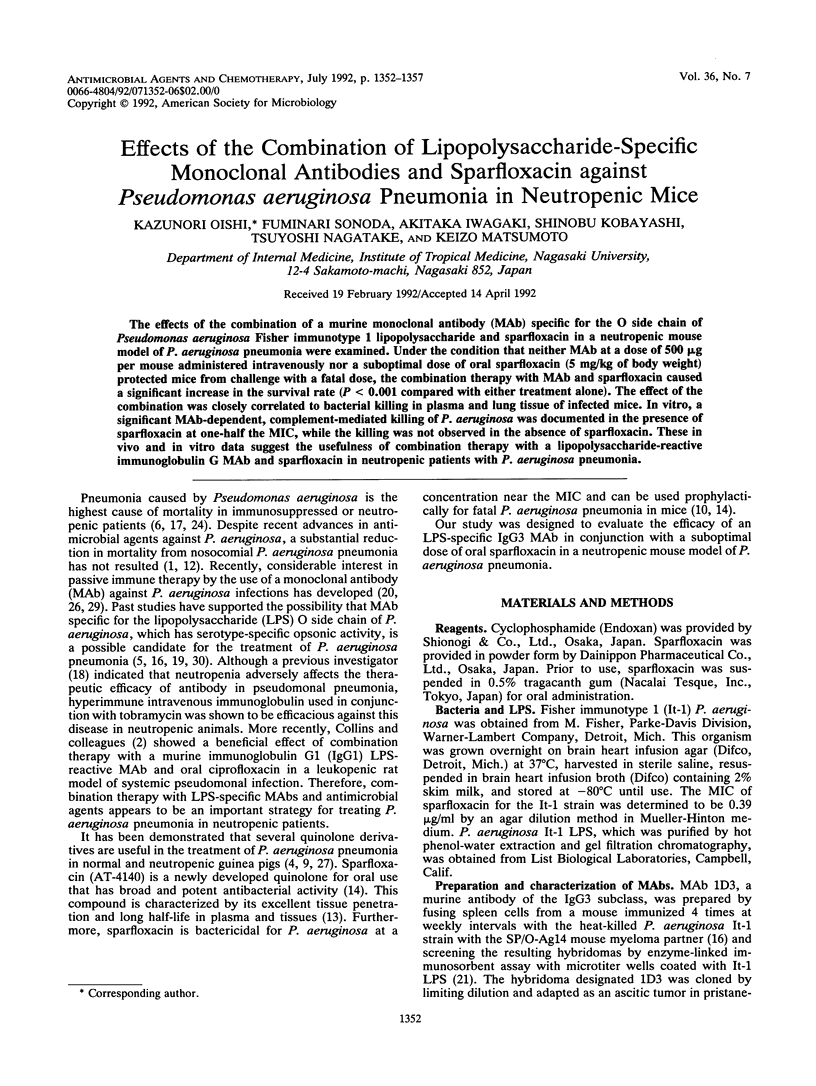
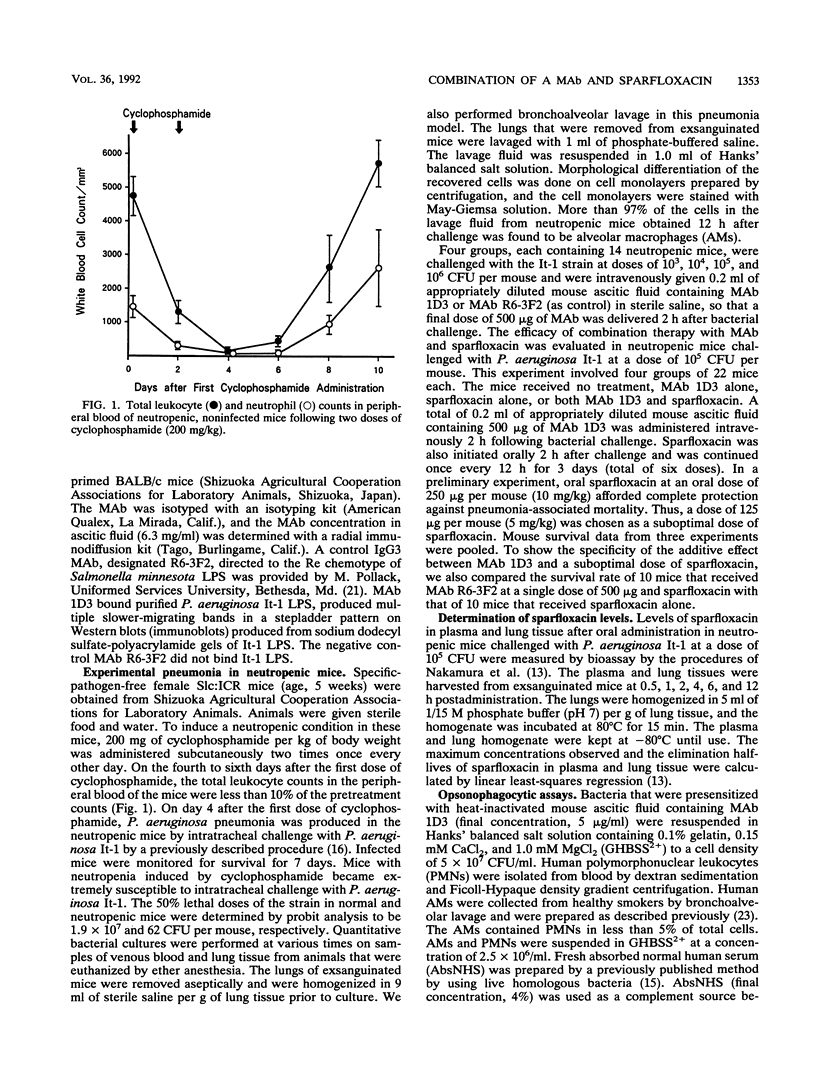
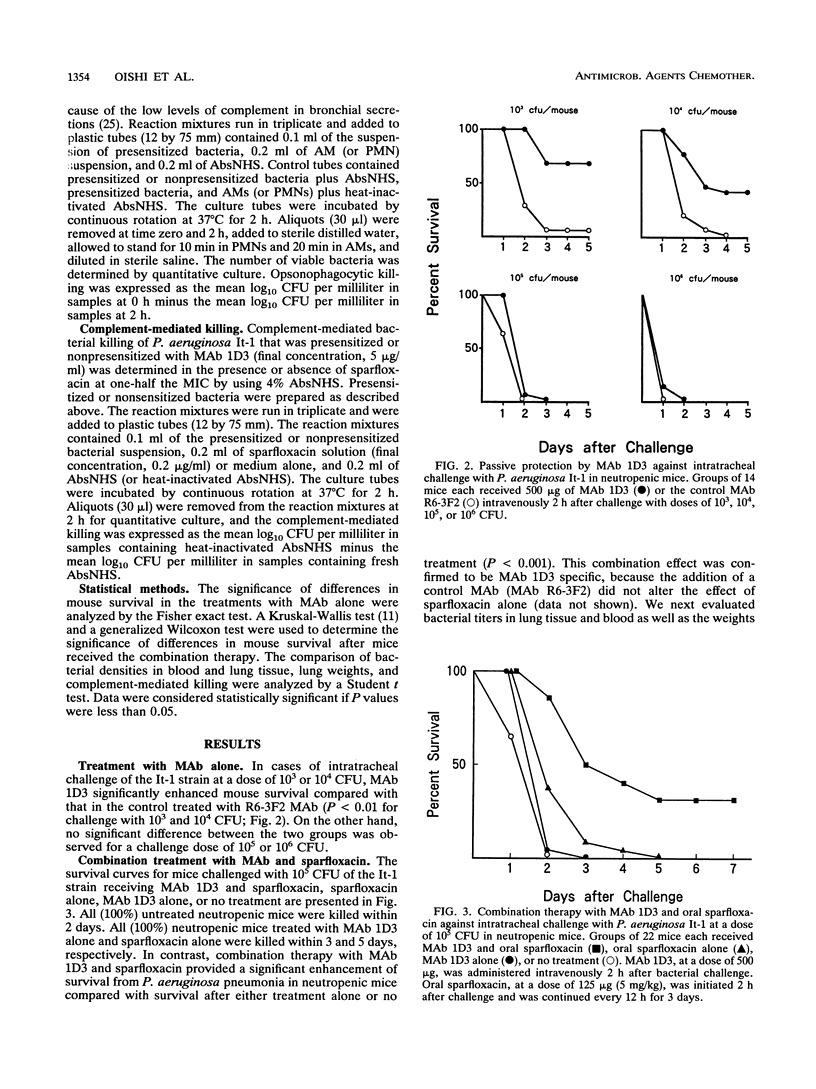
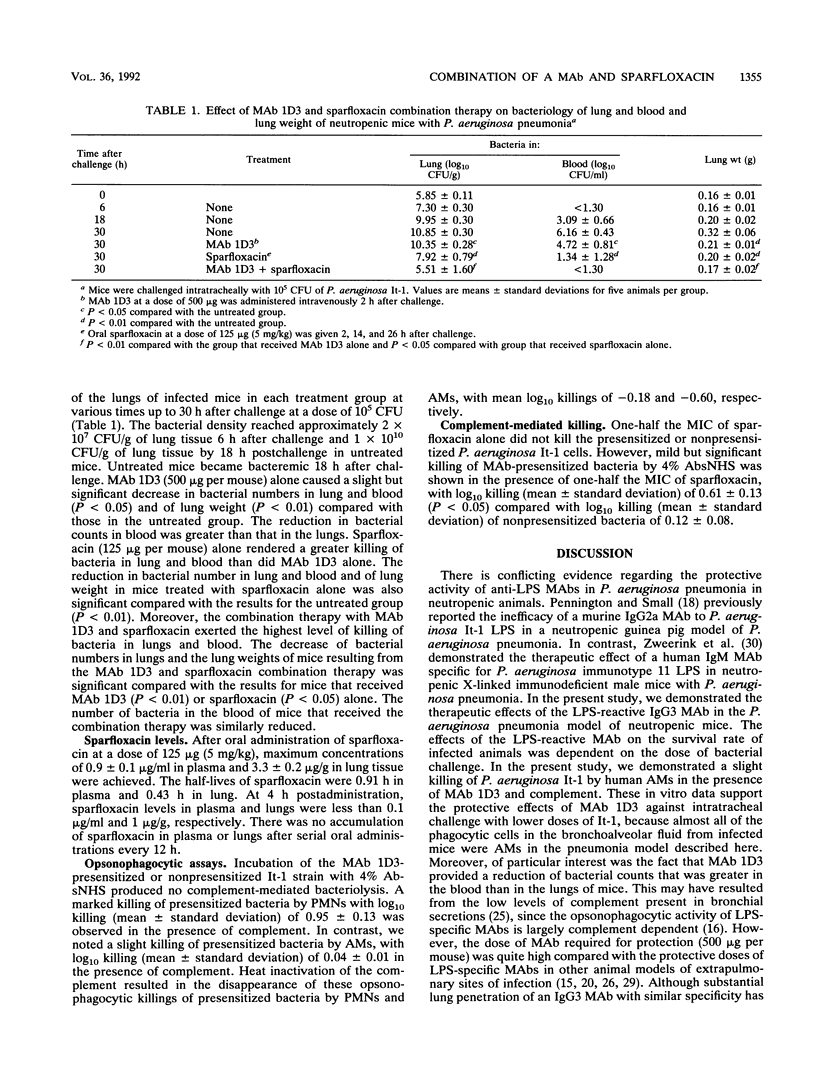
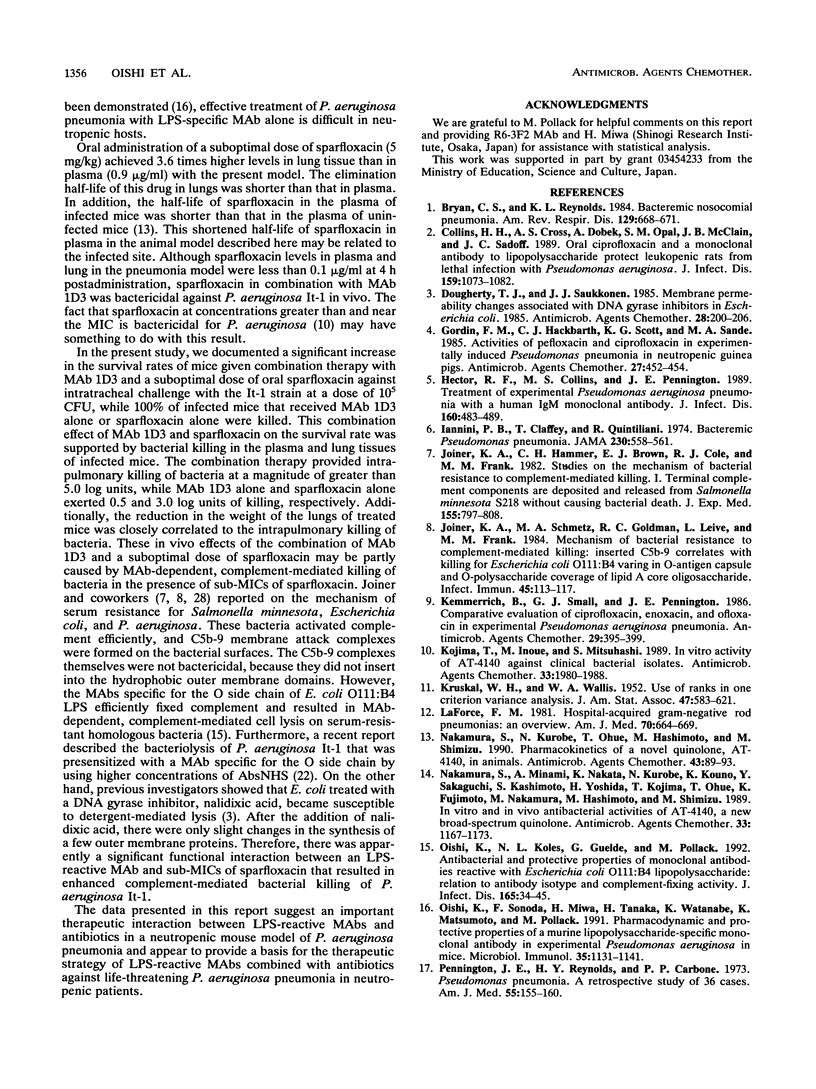
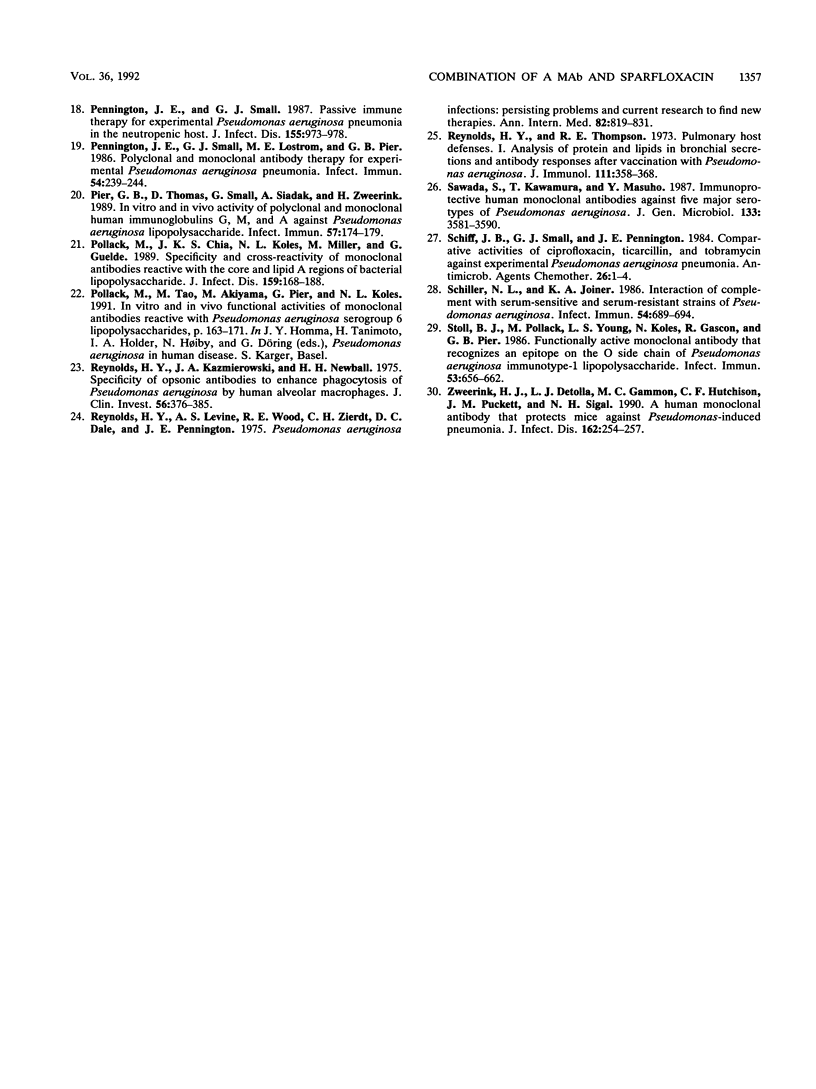
Selected References
These references are in PubMed. This may not be the complete list of references from this article.
- Bryan C. S., Reynolds K. L. Bacteremic nosocomial pneumonia. Analysis of 172 episodes from a single metropolitan area. Am Rev Respir Dis. 1984 May;129(5):668–671. doi: 10.1164/arrd.1984.129.5.668. [DOI] [PubMed] [Google Scholar]
- Collins H. H., Cross A. S., Dobek A., Opal S. M., McClain J. B., Sadoff J. C. Oral ciprofloxacin and a monoclonal antibody to lipopolysaccharide protect leukopenic rats from lethal infection with Pseudomonas aeruginosa. J Infect Dis. 1989 Jun;159(6):1073–1082. doi: 10.1093/infdis/159.6.1073. [DOI] [PubMed] [Google Scholar]
- Dougherty T. J., Saukkonen J. J. Membrane permeability changes associated with DNA gyrase inhibitors in Escherichia coli. Antimicrob Agents Chemother. 1985 Aug;28(2):200–206. doi: 10.1128/aac.28.2.200. [DOI] [PMC free article] [PubMed] [Google Scholar]
- Gordin F. M., Hackbarth C. J., Scott K. G., Sande M. A. Activities of pefloxacin and ciprofloxacin in experimentally induced Pseudomonas pneumonia in neutropenic guinea pigs. Antimicrob Agents Chemother. 1985 Apr;27(4):452–454. doi: 10.1128/aac.27.4.452. [DOI] [PMC free article] [PubMed] [Google Scholar]
- Hector R. F., Collins M. S., Pennington J. E. Treatment of experimental Pseudomonas aeruginosa pneumonia with a human IgM monoclonal antibody. J Infect Dis. 1989 Sep;160(3):483–489. doi: 10.1093/infdis/160.3.483. [DOI] [PubMed] [Google Scholar]
- Iannini P. B., Claffey T., Quintiliani R. Bacteremic Pseudomonas pneumonia. JAMA. 1974 Oct 28;230(4):558–561. doi: 10.1001/jama.230.4.558. [DOI] [PubMed] [Google Scholar]
- Joiner K. A., Hammer C. H., Brown E. J., Cole R. J., Frank M. M. Studies on the mechanism of bacterial resistance to complement-mediated killing. I. Terminal complement components are deposited and released from Salmonella minnesota S218 without causing bacterial death. J Exp Med. 1982 Mar 1;155(3):797–808. doi: 10.1084/jem.155.3.797. [DOI] [PMC free article] [PubMed] [Google Scholar]
- Joiner K. A., Schmetz M. A., Goldman R. C., Leive L., Frank M. M. Mechanism of bacterial resistance to complement-mediated killing: inserted C5b-9 correlates with killing for Escherichia coli O111B4 varying in O-antigen capsule and O-polysaccharide coverage of lipid A core oligosaccharide. Infect Immun. 1984 Jul;45(1):113–117. doi: 10.1128/iai.45.1.113-117.1984. [DOI] [PMC free article] [PubMed] [Google Scholar]
- Kemmerich B., Small G. J., Pennington J. E. Comparative evaluation of ciprofloxacin, enoxacin, and ofloxacin in experimental Pseudomonas aeruginosa pneumonia. Antimicrob Agents Chemother. 1986 Mar;29(3):395–399. doi: 10.1128/aac.29.3.395. [DOI] [PMC free article] [PubMed] [Google Scholar]
- Kojima T., Inoue M., Mitsuhashi S. In vitro activity of AT-4140 against clinical bacterial isolates. Antimicrob Agents Chemother. 1989 Nov;33(11):1980–1988. doi: 10.1128/aac.33.11.1980. [DOI] [PMC free article] [PubMed] [Google Scholar]
- LaForce F. M. Hospital-acquired gram-negative rod pneumonias: an overview. Am J Med. 1981 Mar;70(3):664–669. doi: 10.1016/0002-9343(81)90593-3. [DOI] [PubMed] [Google Scholar]
- Nakamura S., Kurobe N., Ohue T., Hashimoto M., Shimizu M. Pharmacokinetics of a novel quinolone, AT-4140, in animals. Antimicrob Agents Chemother. 1990 Jan;34(1):89–93. doi: 10.1128/aac.34.1.89. [DOI] [PMC free article] [PubMed] [Google Scholar]
- Nakamura S., Minami A., Nakata K., Kurobe N., Kouno K., Sakaguchi Y., Kashimoto S., Yoshida H., Kojima T., Ohue T. In vitro and in vivo antibacterial activities of AT-4140, a new broad-spectrum quinolone. Antimicrob Agents Chemother. 1989 Aug;33(8):1167–1173. doi: 10.1128/aac.33.8.1167. [DOI] [PMC free article] [PubMed] [Google Scholar]
- Oishi K., Koles N. L., Guelde G., Pollack M. Antibacterial and protective properties of monoclonal antibodies reactive with Escherichia coli O111:B4 lipopolysaccharide: relation to antibody isotype and complement-fixing activity. J Infect Dis. 1992 Jan;165(1):34–45. doi: 10.1093/infdis/165.1.34. [DOI] [PubMed] [Google Scholar]
- Oishi K., Sonoda F., Miwa H., Tanaka H., Watanabe K., Matsumoto K., Pollack M. Pharmacodynamic and protective properties of a murine lipopolysaccharide-specific monoclonal antibody in experimental Pseudomonas aeruginosa pneumonia in mice. Microbiol Immunol. 1991;35(12):1131–1141. doi: 10.1111/j.1348-0421.1991.tb01634.x. [DOI] [PubMed] [Google Scholar]
- Pennington J. E., Reynolds H. Y., Carbone P. P. Pseudomonas pneumonia. A retrospective study of 36 cases. Am J Med. 1973 Aug;55(2):155–160. doi: 10.1016/0002-9343(73)90163-0. [DOI] [PubMed] [Google Scholar]
- Pennington J. E., Small G. J., Lostrom M. E., Pier G. B. Polyclonal and monoclonal antibody therapy for experimental Pseudomonas aeruginosa pneumonia. Infect Immun. 1986 Oct;54(1):239–244. doi: 10.1128/iai.54.1.239-244.1986. [DOI] [PMC free article] [PubMed] [Google Scholar]
- Pennington J. E., Small G. J. Passive immune therapy for experimental Pseudomonas aeruginosa pneumonia in the neutropenic host. J Infect Dis. 1987 May;155(5):973–978. doi: 10.1093/infdis/155.5.973. [DOI] [PubMed] [Google Scholar]
- Pier G. B., Thomas D., Small G., Siadak A., Zweerink H. In vitro and in vivo activity of polyclonal and monoclonal human immunoglobulins G, M, and A against Pseudomonas aeruginosa lipopolysaccharide. Infect Immun. 1989 Jan;57(1):174–179. doi: 10.1128/iai.57.1.174-179.1989. [DOI] [PMC free article] [PubMed] [Google Scholar]
- Pollack M., Chia J. K., Koles N. L., Miller M., Guelde G. Specificity and cross-reactivity of monoclonal antibodies reactive with the core and lipid A regions of bacterial lipopolysaccharide. J Infect Dis. 1989 Feb;159(2):168–188. doi: 10.1093/infdis/159.2.168. [DOI] [PubMed] [Google Scholar]
- Pollack M., Tao M., Akiyama M., Pier G. B., Koles N. L. In vitro and in vivo functional activities of monoclonal antibodies reactive with Pseudomonas aeruginosa serogroup 6 lipopolysaccharides. Antibiot Chemother (1971) 1991;44:163–171. doi: 10.1159/000420311. [DOI] [PubMed] [Google Scholar]
- Pseudomonas aeruginosa infections: persisting problems and current research to find new therapies. Ann Intern Med. 1975 Jun;82(6):819–831. doi: 10.7326/0003-4819-82-6-819. [DOI] [PubMed] [Google Scholar]
- Reynolds H. Y., Kazmierowski J. A., Newball H. H. Specificity of opsonic antibodies to enhance phagocytosis of Pseudomonas aeruginosa by human alveolar macrophages. J Clin Invest. 1975 Aug;56(2):376–385. doi: 10.1172/JCI108102. [DOI] [PMC free article] [PubMed] [Google Scholar]
- Reynolds H. Y., Thompson R. E. Pulmonary host defenses. I. Analysis of protein and lipids in bronchial secretions and antibody responses after vaccination with pseudomonas aeruginosa. J Immunol. 1973 Aug;111(2):358–368. [PubMed] [Google Scholar]
- Sawada S., Kawamura T., Masuho Y. Immunoprotective human monoclonal antibodies against five major serotypes of Pseudomonas aeruginosa. J Gen Microbiol. 1987 Dec;133(12):3581–3590. doi: 10.1099/00221287-133-12-3581. [DOI] [PubMed] [Google Scholar]
- Schiff J. B., Small G. J., Pennington J. E. Comparative activities of ciprofloxacin, ticarcillin, and tobramycin against experimental Pseudomonas aeruginosa pneumonia. Antimicrob Agents Chemother. 1984 Jul;26(1):1–4. doi: 10.1128/aac.26.1.1. [DOI] [PMC free article] [PubMed] [Google Scholar]
- Schiller N. L., Joiner K. A. Interaction of complement with serum-sensitive and serum-resistant strains of Pseudomonas aeruginosa. Infect Immun. 1986 Dec;54(3):689–694. doi: 10.1128/iai.54.3.689-694.1986. [DOI] [PMC free article] [PubMed] [Google Scholar]
- Stoll B. J., Pollack M., Young L. S., Koles N., Gascon R., Pier G. B. Functionally active monoclonal antibody that recognizes an epitope on the O side chain of Pseudomonas aeruginosa immunotype-1 lipopolysaccharide. Infect Immun. 1986 Sep;53(3):656–662. doi: 10.1128/iai.53.3.656-662.1986. [DOI] [PMC free article] [PubMed] [Google Scholar]
- Zweerink H. J., Detolla L. J., Gammon M. C., Hutchison C. F., Puckett J. M., Sigal N. H. A human monoclonal antibody that protects mice against Pseudomonas-induced pneumonia. J Infect Dis. 1990 Jul;162(1):254–257. doi: 10.1093/infdis/162.1.254. [DOI] [PubMed] [Google Scholar]


